Low Carb Foods: Complete List
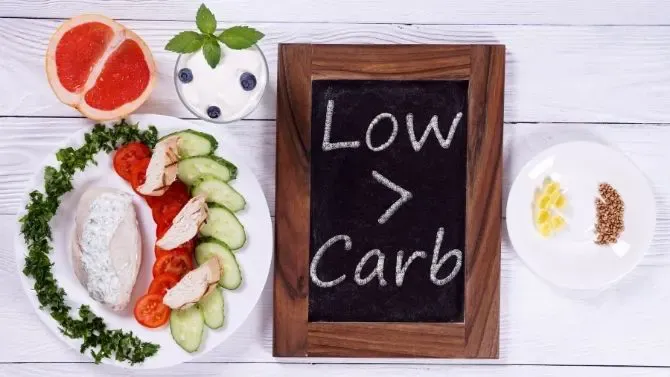
All carbohydrates are made up of individual sugars. Carbohydrates with one or two sugar(s) are called "simple carbohydrates," and those with long "daisy chain" structures are called "complex carbohydrates." The links between individual sugars can affect how the body uses this type of carbohydrate.
Best Low Carb Foods For Weight Loss
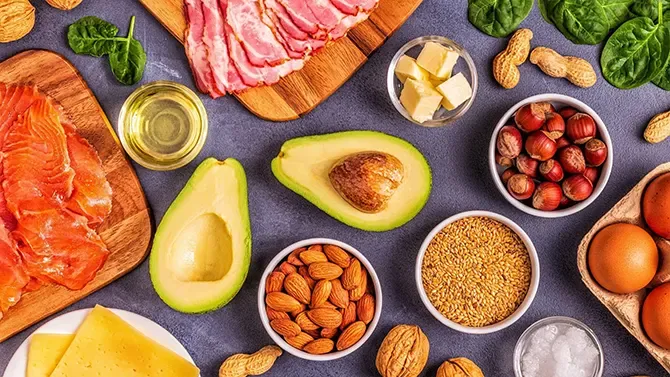
Good carbs and bad carbs
Although all foods can be good foods (depending on how they are used in a healthy lifestyle), some carbohydrates are more beneficial for maintaining better health.Complex carbohydrates, found in fruits, vegetables, grains, and whole grains, take longer to break down, providing better blood sugar regulation and keeping you feeling full longer. They may also facilitate the absorption of certain nutrients and minerals in the intestines.
Fiber is considered a complex carbohydrate and brings many health benefits, including a reduced risk of constipation and a lower risk of certain cancers. Everyone should consume around 30g of fiber per day for better health.
Bad carbs are typically made up (all or mostly) of simple sugars. These can quickly elevate blood sugar, triggering a more significant and just as rapid insulin response. Insulin is a hormone whose role is to help transport carbohydrates to cells. This rapid rise and subsequent decline in blood sugar can make you feel sluggish, tired, and moody, which may actually lead to eating more of these simple carbohydrate foods to combat these feelings.
The combination of this continuous cycle and its eventual effect on our cells' insulin response and sensitivity to insulin, along with poor weight management control, can contribute to the onset of metabolic diseases, such as metabolic syndrome or "prediabetes," or diabetes itself if the condition progresses.
Low carb diets
Although carbohydrates are our primary energy source, they are not considered essential. We can use other nutrients to meet our energy needs. Considering this and the fact that frequent excess carbohydrates can contribute to weight management and metabolic disorders (such as diabetes), low-carb strategies in dieting make sense.This has been the subject of much thought in recent years, with many iterations of a low-carb diet becoming more popular in the eyes of the general public (initially, these diets were actually used to treat epilepsy) and now used more for weight management.
While there is no general consensus on whether or not a low-carb diet is helpful for certain situations, research generally tends to place the dividing line around 130g and 150g. Severely low carb diets would fall into the ketosis category, and they typically include a dose of less than 50g of carbs per day.
List of Low Carb Foods
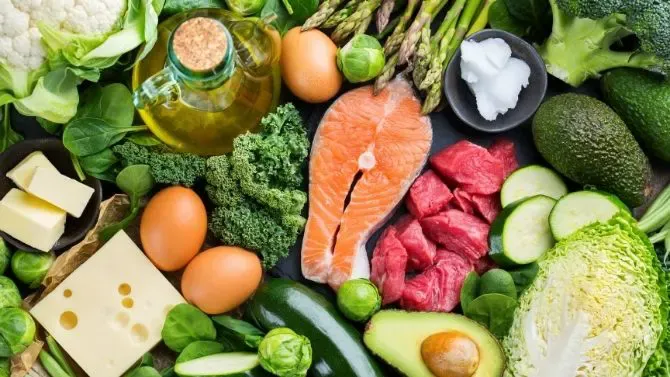
Fruits and vegetables
Fruits and vegetables are full of nutrients and minerals essential for good health, which can help prevent non-communicable diseases and support weight management efforts. Although they are a natural source of carbs, some options are great for a low-carb diet.Watermelon, Galia melon, and honeydew melon
All from the melon family, these are great options for staying hydrated during the summer months (given their high water density and high electrolyte content). They're delicious in a wide range of dishes, including savory (try the prosciutto-wrapped honeydew melon if you don't believe us!) and packed with vitamins, including vitamins A and C.Carbohydrates: These will give you between 7 . 5 and 9 g of carbohydrates per 100 g of melon.
Lawyers
It may surprise you, but avocado is indeed a fruit. Fruit is rich in fats, vitamins, minerals, and fibers excellent for health.Carbohydrates: About 100 g of avocados will provide you with carbohydrates between 1 and 3 g.
Berries
Berries are a great inclusion to any diet. Not only are they one of the most nutrient-dense foods in terms of vitamins and minerals, but they are also packed with phytochemicals (which have many health benefits) and are incredibly versatile in terms of cooking.Carbohydrates: A 100g serving of mixed berries contains between 5 and 10g of carbohydrates (this varies depending on the type of berry).
Leafy green vegetables
Leafy green vegetables, such as kale, spinach, and cabbage, are good sources for many vitamins (such as vitamins A, C, and K and folate) and many minerals (such as iron and calcium). They are also a great source of fiber, low in calories per serving (which makes them a great weight management tool).Carbohydrates: A 100g serving of leafy green vegetables typically contains less than 5g of carbohydrates.
Cucumber and zucchini
Cucumber is an excellent source of vitamins and minerals, including vitamin C, vitamin K, magnesium, potassium, and manganese. Due to their high water content (over 95%) and being a source of electrolytes, cucumbers are a great addition to any diet to ensure proper hydration. Courgettes have similar properties to cucumbers and can be incorporated quickly, such as making courgette spaghetti a sophisticated alternative to pasta.Carbohydrates: A serving of 100 g will provide you with less than 4 g of carbohydrates.
Cauliflower and broccoli
Cauliflower and broccoli are incredibly versatile ingredients. Foils can be used in many dishes and even blended to create delicious alternatives to rice and pizza dough!Carbohydrates: A serving of 100 g will provide you with less than 6 g of carbohydrates and a few grams of fiber as well.
Peppers
A super source of vitamin C, polyphenols, and capsaicin, a naturally active and valuable component in weight control. Peppers are a great addition to any dish and can be sautéed, roasted, curried, or even nibbled raw!Carbohydrates: You will find less than 5 g of carbohydrates per 100 g of peppers.
Mushrooms
Mushrooms are an exciting option to flesh out any meal. Not only are they low in calories, but they're also a great source of protein and fiber. They are also delicious on their own, filled with other low-carb ingredients.Carbohydrates: A 100g serving of cooked mushrooms will provide you with approximately 4g of carbohydrates.
Tomatoes
Tomatoes have a similar nutrient profile to bell peppers, except they are higher in vitamin A and lower in calories.Carbohydrates: 100 g of tomatoes will provide you with a little less than 3.5 or 4 g of carbohydrates.
Eggs and dairy products
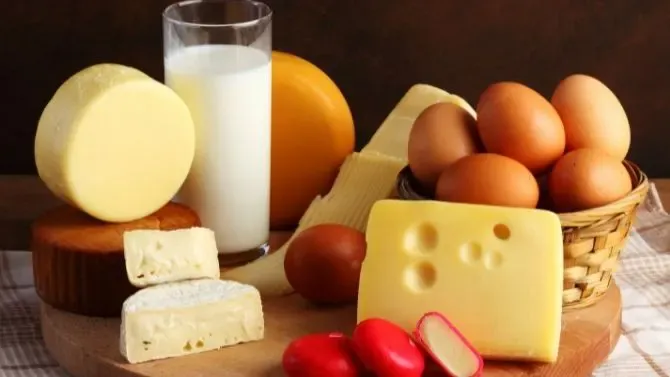
Eggs
Eggs are an excellent source of high-quality protein, packed with a wide range of vitamins and essential fatty acids. Incredibly versatile, eggs are an ideal addition to any low-carb diet or recipe and can boost any meal without adding calories (especially if you exclude the yolks).Carbohydrates: A size L egg (50 g) provides less than 1 g of carbohydrates.
Milk
Despite what you might think, cow's milk is on the menu for those who want to adopt a low carbohydrate diet! Packed with wholesome, health-boosting vitamins and minerals, as well as an essential source of high-quality protein, milk will work in your diet as long as you watch the portions.Carbohydrates: A 100ml serving will give you less than 6g of carbohydrates, the amount depending on how the milk is produced (high-fat milk being those with the least carbohydrates).
Cheese
Does the cheese only have one defect? An essential source of protein and minerals (like calcium), cheese can be eaten raw and cooked. It can therefore be included in any dish. Let your imagination be free!Carbohydrates: A 100 g serving of cheese provides less than 4.5 g of carbohydrates (the least important source of carbohydrates being goat cheese and the most important being feta).
Fromage blanc
Cottage cheese is an excellent source of protein (about 20g per 100g). It mainly contains casein protein, which takes a long time to digest, which brings a feeling of satiety for longer. Due to the way it is produced, it is also a perfect addition to the health of your intestines.Carbohydrates: A portion of 100 g of white cheese provides less than 3.5 g of carbohydrates.
Whole milk yogurt
A great alternative to most yogurt in supermarkets, whole milk yogurt includes the same quality vitamins, minerals, and proteins as cow's milk. It's also a great source of probiotics, essential for gut health!Carbohydrates: A 100 g serving of whole milk yogurt provides less than 8 g of carbohydrates.
Kefir
Kefir grains contain many strains of bacteria and yeast, making them a rich and varied source of probiotics, the healthy bacteria in the intestines, which aid digestion and boost the immune system. In addition, it is rich in tryptophan, an essential amino acid that contributes to relaxation and a good mood.Carbohydrates: You can count less than 5 g of carbohydrates for 10 ml of pure milk kefir.
Quark
Quark is a great low-carb option. It's packed with protein, calcium, and probiotics essential for proper bowel function.Carbohydrates: This soft cheese will provide you with 3 to 4 g of carbohydrates per 100 g.
Alternatives to dairy products
Dairy alternatives, such as soy, almond, coconut, rice, oat, etc., are ideal for those who suffer from lactose intolerance. Opt for unsweetened options to keep the carbs low.Carbohydrates: In general, 100 ml of vegetable milk provides less than 10 g of carbohydrates.
Spreads, fats, and oils

Butter
A few things are as delicious as a buttered toast on a Sunday morning. However, rich in specific vitamins and minerals, it is vital to consider the higher level of fat, which can hurt your health if you consume too much. Be sure to consume butter in moderation, and give particular importance to taste.Carbohydrates: Butter contains virtually no carbohydrates, especially in 10-15g servings.
Vegetable spreads
Plant-based spreads are a healthier alternative to butter. They are richer in fat, contributing to good cardiovascular health and improving cholesterol levels.Carbohydrates: Like butter, the amount of carbohydrates in vegetable spreads is negligible.
Margarine
Margarine is a critical component of many recipes, especially pastries, providing richness and texture.Carbohydrates: For 100 g of margarine, count less than 1 g of carbohydrates.
Olive oil
Olive oil is a significant component of the Mediterranean diet. It is rich in antioxidants and monounsaturated fatty acids, which contribute to a better state of health and can be integrated into your diet in place of trans and saturated fatty acids.Carbohydrates: One tablespoon of olive oil has only trace amounts of carbohydrates.
Coconut oil
Coconut oil can be excellent cooking oil with unique health benefits. It contains medium-chain triglycerides, which can provide a quick source of energy that does not affect blood sugar levels due to their chemical structure. Coconut oil can be particularly beneficial for those looking to control their weight.Carbohydrates: One tablespoon of coconut oil has only trace amounts of carbohydrates.
Oils from other nuts and seeds
There is a wide range of nut and seed oils. Depending on what you're cooking and the cooking method you use, it's important to remember that oils have different flavors and smoke points.Carbohydrates: Almost all oils include only trace amounts of carbohydrates for a one tablespoon serving.
Nuts and seeds

Peanuts
Peanuts are a great source of healthy fats while also packed with other important vitamins and minerals. They are also a good source of protein and offer fiber too!Carbohydrates: A 35g serving of whole milk peanuts provides less than 4g of carbohydrates.
Hazelnut
Hazelnuts are abundant in monounsaturated fats, ideal for replacing health-damaging fats, and therefore can promote heart health and maintain healthy cholesterol levels.They are also packed with photophilic, vitamin E, manganese, zinc, and fiber.
Carbs: Expect less than 2.5g of carbs for a 35g serving of hazelnuts.
Almonds
Almonds have an excellent dietary profile and are packed with fiber. They are also rich in vitamin E, magnesium, calcium, zinc, and even B vitamins.Carbohydrates: A serving of 35 g of almonds provides less than 3 g of carbohydrates.
Pecan nuts
Pecans are packed with healthy fats and fiber. Unique in their kind, they also provide:Many phytochemicals (potent antioxidants).
Fat-soluble bioactive components.
Essential minerals (magnesium, manganese, zinc).
Carbohydrates: 35 g of pecans provides just under 2 g of carbohydrates.
Brazil nut
Their high good fat profile is one of the many reasons to include Brazil nuts on the menu. They are also rich in magnesium, selenium, and a range of potent antioxidants.Like pecans, expect 2g of carbs per 35g serving.
Linseed
Flaxseeds are an excellent low-carb dietary addition, rich in omega 3 fatty acids, fiber, and healthy phytochemicals.Carbohydrates: One tablespoon of flax seeds contains less than 3.5 g of carbohydrates.
chia seeds
These whole grains are packed with nutritional goodness, filled with various vitamins and minerals and fiber.
Carbs: Chia seeds will give you just under 4.5g of carbs per tablespoon.
Sunflower seeds
Sunflower seeds are rich in polyunsaturated acids contain dozens of vitamins, minerals, and phytochemicals. They are also a significant source of protein and fiber.Carbohydrates: A 25g handful of sunflower seeds for snacking provides less than 5g of carbohydrates.
Sesame seeds
Sesame seeds are a great addition to salads and many other dishes. They also add an extra layer of texture to baked goods (bread, bagels, etc.). They are also a good source of healthy fats, vitamins, and minerals and go great with a low-carb diet/recipe.Carbohydrates: A 10 g handful of sesame provides less than 2 g of carbohydrates.
Meat
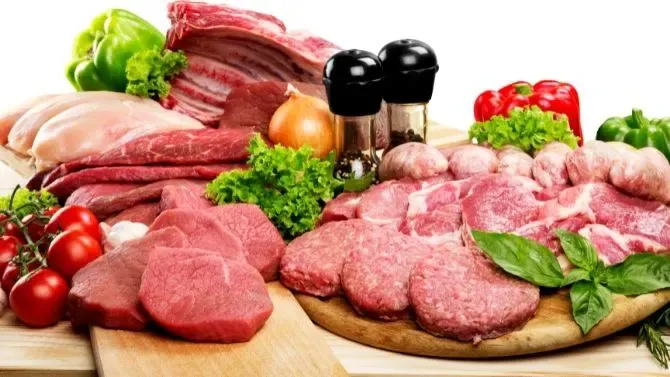
Chicken
Chicken is one, if not the most consumed, meat globally. An excellent source of protein and packed with vitamins and minerals, chicken is a highly versatile meat that can be used in various exciting ways.Carbs: This is also a great low-carb option, with only trace amounts of carbs per 100g of cooked meat (any piece, no sauce).
Beef
From burgers and steaks to ribs and hash, the ways beef can be incorporated into a dish or enjoyed on its own make it an incredibly valuable inclusion to any low-carb diet. As nutritious as it is delicious, beef is rich in vitamins and minerals (especially iron) and is an excellent source of protein;Carbohydrates: A 100 g serving of beef (in any form, without sauce) provides almost no carbohydrates.
Turkey
Turkey is underrated meat. Its breast is leaner than the chicken, and the other poultry pieces are tastier than the latter. It is necessary to include it more in the dishes of our daily life. An excellent source of dietary protein and rich in vitamins and minerals, turkey, is worth a try.Carbs: 100g of turkey (any cut, no sauce) has only trace amounts of carbohydrates.
Lamb
Speaking of rich food, lamb brings a particular flavor of expertise to your culinary endeavors. With uses as diverse as tasty, lamb is also ideal for those who care about their health. Another excellent source of protein, vitamins, and minerals (as rich in iron as beef), lamb is also a unique source of conjugated linoleic acids. These have been linked to improved metabolic health and reduced risk of many diseases).Carbohydrates: Expect only a few traces of carbohydrates per 100g of lamb (whole cut, no sauce).
Offal
For some to try, some have more meat cuts, and organ meats are arguably the wealthiest cuts in healthy vitamins and minerals. Their flavor and texture can determine many, so it may be a good idea to look for recipes that can minimize these issues (curries, stews, etc.) and thus benefit from all the protein they offer at a price. Extremely affordable.Carbohydrates: Like all other meats, expect negligible carbohydrates per 100g (any cut, no sauce).
Seafood

Tuna
Tuna is a good source of essential nutrients, such as omega 3 fatty acids, premium protein, selenium, and vitamin D. Shredded or as a steak, tuna is an excellent addition to any low-carb diet. Carbohydrates.Carbohydrates: A 100g serving of tuna contains only trace amounts of carbohydrates.
Varieties of white fish
Varieties of white fish (cod, haddock, whiting, hake, pollock, and others) are high in protein, healthy fats, and B vitamins (including vitamin B12), as well as other vitamins and minerals. They also tend to be lower in calories and are a great alternative to meat.Carbohydrates: Across the spectrum of available whitefish species, a 100g serving has only trace amounts of carbohydrates.
Salmon, anchovies, and other varieties of dark-fleshed fish
Like white-fleshed species of fish, salmon, anchovies, and other varieties of dark-fleshed fish have a high protein content and are a good source of essential vitamins and minerals. On the other hand, they stand out for their high content of omega 3 fatty acids, which play an important role in mental and physical health.Carbohydrates: A 100g serving of dark-fleshed fish contains only trace amounts of carbohydrates.
Crustaceans (crab, lobster, etc.)
With a nutritional profile similar to white fish varieties, shellfish differ in the richness and texture they can bring to a dish. With a denser flavor, crustaceans are the stars of the seafood family.Carbohydrates: 100 g of crustacean meat contains only a few traces of carbohydrates.
Shrimps and prawns
Low in calories and high in protein, incorporating these nutritional wonders into your diet should extend beyond Christmas cocktails. Curry, salads, on their own, and wherever your imagination takes them, all of these options will give you a fantastic dining experience.Carbohydrates: There are only a few traces of carbohydrates in 100 g of prawns and prawns.
Squid
A squid is an excellent option for those looking to expand their culinary skills and expand their palate. High in protein, low in fat, and packed with essential vitamins and minerals like vitamins B12 and B6, vitamin E, and selenium, calamari is an underrated option.Carbs: It is also great for low-carb meals. Expect an almost non-existent amount of carbs per 100g of squid.
Caviar
Caviar is a good source of protein, omega 3, vitamins, and minerals. It is particularly rich in vitamin B12. Other nutrients are vitamins A, E, and B6, iron, magnesium, and selenium. It is, of course, a luxury product, but it fits perfectly into a low carbohydrate diet.Carbohydrates: A 100g serving of caviar provides just under 4.5g of carbohydrates. With a serving being 30-50g, expect less than 2.5g of carbs per serving.
Carb-rich foods to avoid
As part of a low carbohydrate diet, it is essential to identify foods characterized by a high concentration of "bad carbohydrates." Here are 10 foods you should altogether avoid on your low-carb diet, or at least limit.Bread
From unleavened bread to bagels, bread comes in a wide variety of forms and has been a staple of many cuisines for thousands of years. Healthier options, such as wholemeal bread, are a good source of B vitamins, dietary fiber, and iron and have many benefits. On the other hand, white bread is made with processed flour that lacks fiber, vitamins, and minerals compared to whole-grain alternatives and provide almost nothing more than carbohydrates.Carbohydrates: Whether made from whole grain flour or refined flour, bread is rich in carbohydrates regardless of their creation and form. A slice of white bread contains about 14 g of carbohydrates, while a piece of wholemeal bread gives you 17 g of carbohydrates.
Pasta
Versatile and widely available, pasta is a popular ingredient used in so many dishes. On the other hand, in a low-carb diet, consuming pasta in any form is not a good idea because it is very high in carbohydrates.Carbohydrates: 250 g of pasta contains 43 g of carbohydrates.
Rice
Like bread, rice is a staple ingredient in many cuisines worldwide, which comes in one form or another. There are many rice varieties, but these generally fall into two categories: white rice and brown rice. Although brown rice is healthy, both types are high in carbohydrates and should be limited or avoided on a low-carb diet.Carbohydrates: A glass of long-grain brown rice contains about 52g of carbohydrates. Almost the same amount of carbohydrates (53 g) are found in the same size serving of short-grain white rice.
Sugar, honey, and maple syrup
It goes without saying that if you are on a low-carb diet, you should altogether avoid foods high in sugar, such as desserts. This also applies to natural forms of sugar, such as honey and maple syrup, since these contain as many, if not more, carbohydrates than white sugar.Carbs: One tablespoon of white sugar contains about 13g of carbs, and you can expect the same serving of honey or maple syrup to have 17g and 13g of carbs, respectively.
Mealy vegetables Corn, potato and sweet potato
While low-carb diets allow you to eat as many non-starchy vegetables as you want, starchy vegetables, such as potatoes, contain a relatively high amount of carbohydrates and should be avoided or limited.Carbs: A medium potato provides about 37g of carbs, a medium sweet potato provides nearly 24g of carbs, and a glass of corn provides about 41g of carbs.
Beans and vegetables
Although these fiber-rich foods are nutritious and have many health benefits, such as reducing inflammation and the risk of heart disease, beans and vegetables contain a significant amount of carbohydrates.Carbohydrates: One cup (150g – 200g) of the cooked product provides the following amounts of carbohydrates: 40g for lentils, 25g for peas, 40g for kidney beans, and 41g for black beans.
Sweetened yogurt
Featured in the list of low-carb foods above, plain yogurt is relatively low in carbs. However, it's a far more popular alternative, sweetened yogurt, with as many carbs as dessert. In fact, similar servings of sweetened yogurt and ice cream can have nearly the same amount of carbs.Carbohydrates: 250 g of sweetened yogurt contains up to 47 g of carbohydrates. It is, therefore, a food to absolutely avoid as part of a low carbohydrate diet.
Dates and grapes
Although they are tasty to many dishes, raisins and dates are both carbohydrate-rich and sugar-rich nuts.Carbs: A 28g serving of grapes has about 22g of carbs, while two significant dates have about 36g of carbs.
Cereals
Everyone knows that sugary breakfast cereals, such as frozen cornflakes, contain many carbohydrates. However, the number of carbs in healthier alternatives such as oats and whole grains might also surprise you.Carbohydrates: A 90g serving of rolled oats contains 32g of carbohydrates, while 45g of granola represents 37g of carbohydrates.
Fruit juice
Although nutritious, fruit juice is one of the worst drinks, you can consume on a low-carb diet, as it contains rapidly digested carbohydrates that raise blood sugar.Carbohydrates: Apple juice contains about 48 g of carbohydrates for a 35 cl serving.
Complete Low Carb Foods List
You may feel like you face insurmountable hurdles when determining low-carb foods and recipes or putting together a suitable diet. Carbohydrates are arguably the most common nutrient group and figuring out which foods might work.We hope this list helps you find the foods (some of which may surprise you) that meet the low-carb criteria and allow you to diversify your low-carb cooking.
Read More:
Post a Comment